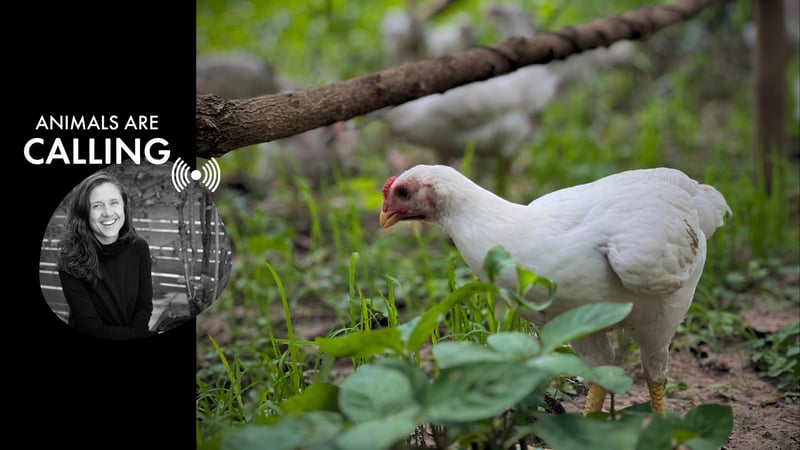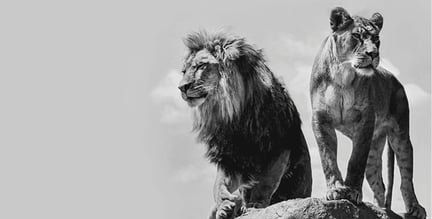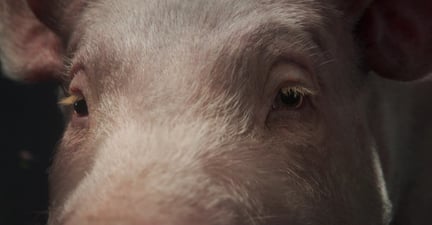
Seeing 'Meat Animals' as Living Beings, Not Mere Products
Blog
In this Q&A, explore what our understanding of — and cultural disconnect from — animal sentience means for farmed “meat animals” and their future welfare.
- Join World Animal Protection as we work to understand how animals think and feel
- This transcript is taken from the World Animal Protection podcast, Animals are Calling, hosted by John Bunyan
- In this episode, we speak with Jo-Anne McArthur, an award-winning photographer and author who has dedicated years to documenting our complex relationship with animals around the world
- We are also joined by Dr Hannah Larsen, whose research focuses on identifying how differences in individual personality or behavioural traits could influence the welfare of animals in commercial conditions.
Increasingly, animal welfare legislation is recognising that we not only need to protect animals from physical cruelty but from psychological harm too. This is particularly relevant to factory farming practices where “meat animals” experience extensive stress due to harsh living conditions.
In this Q&A, World Animal Protection speaks to McArthur and Larsen about what our understanding of — and cultural disconnect from — animal sentience means for farmed animals and their future welfare.
Can animals feel emotions similar to humans?
We know that all animals — including captive bread meat animals — can feel a wide range of emotions, like pleasure, pain, joy, and fear. These emotions can be complex and different for each animal. Jo-Anne recounted a story about chickens she’d grown up with:
“I could see that some chickens wanted time apart from the others. They were shy or introverted. And then there were the bully chickens, dominant chickens, and jealousies. These animals weren't just experiencing very basic emotions.”
Many of the animals Jo-Anne works with experience a lot of fear.
“Animals express fear by panting or screaming. In fur farms, chickens will spin in circles really quickly when faced with a fox or mink. It's quite incredible how, when you get to know pigs, you can see the expressions on their faces. You can see if their brows are furrowed in fear, or if they're panting, if they're despondent. I try and document something of their experience and the experience of their offspring.”
How does factory farming affect animals?
Most people don’t realise that factory farming is still increasing in intensity. Just a few years ago, crates on intensive chicken farms would have been stacked three or four high. Jo-Anne now sees them stacked so high she can’t see half the cages.
In these conditions, chickens can’t spread their wings and pigs can’t turn around. This is problematic because animals can’t develop properly when they have less space. Some pigs still can’t walk when they’re 40 days old because of how they’ve been bred.
Even when animals don’t look openly distressed, it doesn’t mean they aren’t. Hannah describes animals who don’t show any negative or stressed behaviours because they’ve learned that they can’t control what’s going to happen to them. They’re not happy. They’re depressed.
How do we disconnect from recognising sentience in farmed animals compared to pets?
For many people, eating animals is a huge part of their culture. This can make it difficult for us to accept that these “meat” animals are sentient beings with complex emotional worlds. Often, we’re taught not to care about the feelings of farm animals.
There’s also a huge lack of awareness. Most people never experience what life’s like for factory farmed animals so it’s easy not to think about it.
Often, that's where the disconnect comes from. People care about animals but don't know about some of these issues. So, it’s really hard for them to make an informed decision about what to do.
What are some of the negative impacts of factory farming on human health?
Factory farming is paving the way for another global health crisis. It’s driving antimicrobial and antibiotic resistance and the subsequent rise of superbugs.
Antimicrobials are antibiotics or other compounds that are designed to stop the growth of bacteria. 75% of all the antimicrobials used across the world are used for farmed animals. These antimicrobials then come out of the farming system and into the environment.
When this happens, bacteria are exposed to so much of these antimicrobials that they mutate and develop ways to survive. This is a serious threat to human health because we won’t have antibiotics to treat simple bacterial infections.
There’s a direct link between antimicrobial use and animal welfare. Hannah points out that the root causes of most illnesses in factory farmed animals are stress and poor conditions. If we considered animal sentience, we wouldn't need to treat these with antibiotics.
How can consumers make better choices regarding animal products?
It can be very difficult for consumers to make good choices when it comes to animal products and the marketing can be very misleading. Free range eggs are a great example.
Obviously, hens who are free range have better lives than battery farmed ones, but things get more complicated when you take sentience into account. The idea of ‘free range’ is based on how much space each chicken has, but that’s not necessarily the way to promote their welfare.
Lots of free range chickens have a shed in the middle of an open paddock but chickens aren't naturally an open paddock animal. They’re prey animals and they live in the forest so they want a lot of protection and cover. They find open spaces really stressful.
So, free range is a good choice but we need to understand that sentience is much more complicated. There’s more work to do.
Hannah is keen to remind consumers that we shouldn’t take a farm’s word for their welfare standard. Doing a little bit of research to understand different accreditation schemes helps us make genuinely ethical choices.
How can we help improve the lives of farmed animals?
One of the biggest steps taking place right now involves incorporating animal sentience into animal welfare legislation. Hannah explained that her native New Zealand has been doing just that.
“We're recognising not only that we need to protect animals from physical cruelty and physical harm, but there's also psychological harm that we need to protect animals from. Legislation is certainly taking sentience into consideration, particularly related to the negative psychological harm.”
Ensure farm animal welfare is top of the list
The welfare, treatment, and attitude towards farmed “meat” animals across the world needs to change — and you have the power to drive that change. Together, we have a responsibility to raise awareness about sentience in farm animals, make ethical choices around our consumption of animal-based products, and support people and organisations promoting animal welfare.
Join World Animal Protection and work with others across the globe to create an ethical, compassionate world where respect for animals and nature sits at the heart of our food system.
Related content
Animals are Calling
Podcast
Discover Animals Are Calling, a podcast from World Animal Protection that explores animal sentience and the hidden impacts of factory farming, wildlife exploitation, and habitat loss.
Do you think that I'm thinking?
Sentience
Have you ever considered the pain and suffering that pigs go through? Take a moment to meet a sow, living in a factory farm environment.
Animal Sentience
At World Animal Protection sentience is at the heart of everything we do, click to find out more.


